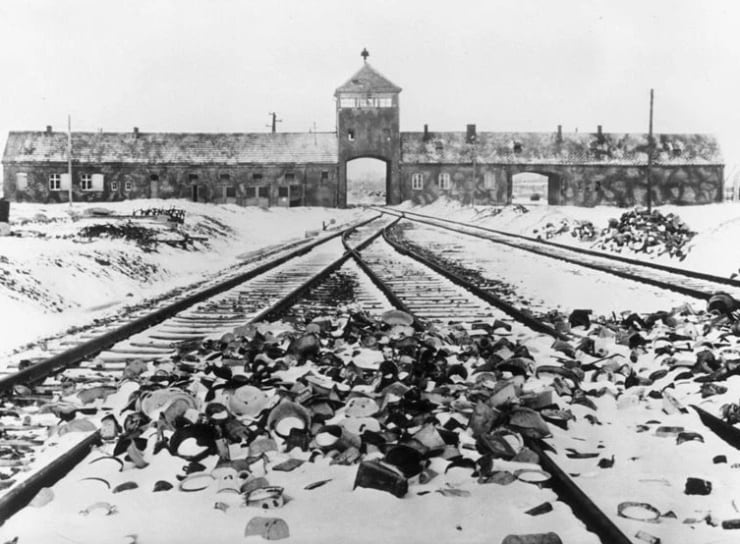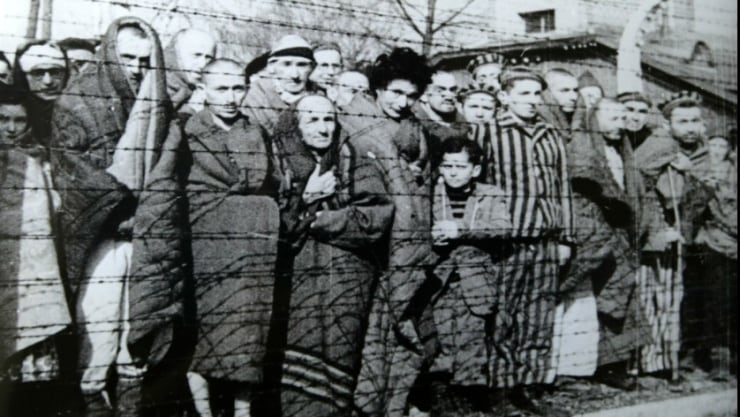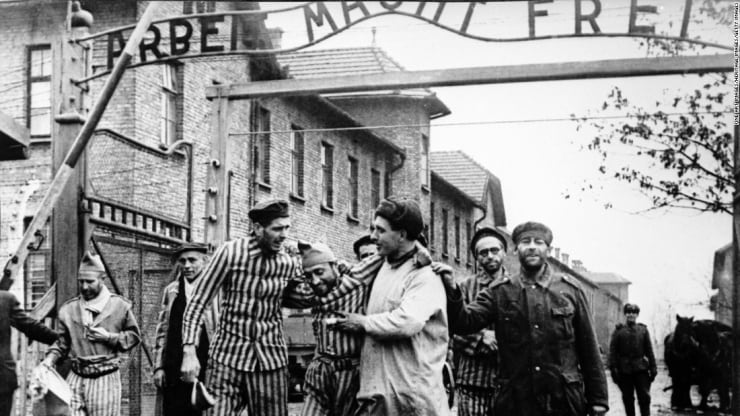..Tuhle historii by lidstvo nemělo nikdy zapomenout.
Nerozumím tomu, že v poslední době se začíná vynořovat víc a víc různých pochybovačů halokaustu. Chtěl bych jim vidět do hlavy.
Víc autentické zvěrstvo snad už nejde předložit.
27.1.1945 - Liberation of Auschwitz concentration camp
Categories: Second World War , War crimes , Calendar
Hundreds of prisoners were waiting for the liberation of the Auschwitz concentration camp at the end of the Second World War. When the Nazis learned that the Red Army was approaching, many Jews were still shot.
Soldiers of the 60th Army of the 1st Ukrainian Front opened the gates of the Auschwitz concentration camp on January 27, 1945. The prisoners welcomed them as liberators. "It is a paradox when soldiers formally representing Stalinist totalitarianism came to the aid of the prisoners of Nazi totalitarianism," writesnow appears on the website of the Auschwitz Museum, which is located on the site of the concentration camp.
The Red Army received detailed information about Auschwitz only after the liberation of Krakow and therefore could not have reached the gates of Auschwitz earlier. Prisoners waited for liberation not only in the main camp, but also in the subsidiary camps - Monowitz and Birkenau. Over 230 Soviet soldiers died during the fighting that accompanied the liberation of the camps. Most of them were buried in the municipal cemetery in Auschwitz.
In the main camp, Soviet soldiers discovered the corpses of about 600 prisoners who had been shot by Nazi soldiers when they learned that the enemy was approaching and had to flee. Other prisoners were dying of exhaustion. German guards were also reportedly ordered to destroy the crematoria and gas chambers a few days before the liberation. Tens of thousands of prisoners who were able to walk were thrown out of the camp by the Nazis and were forced on a death march to other camps in Germany.
Auschwitz is still the most famous concentration camp today. Hundreds of thousands of Poles perished there, as well as Jews from other European countries who were imprisoned in appalling conditions and many were killed in the gas chambers. According to some sources, as many as six thousand people could be killed in them every day. Since the camp was established in 1940, only a handful of prisoners able to tell of the horrors that took place there have managed to escape. Approximately 1.1 million men, women and children were murdered at Auschwitz. More than ninety percent of them were Jews.
"At the last minute, our death sentence was commuted to life imprisonment in Auschwitz and we were handed over to the hellish gates of the concentration camp. There we were still to be interrogated. On arrival we had to strip naked. They cut our hair and shaved us. From then on, we had no names. We were led under numbers tattooed on our arms. I was 39934 and my mother was 39933," recalls one of the survivors.
Historians estimate that over ten million people died in the Nazi concentration and extermination camps in total. The trials of Nazi war criminals took place in the early post-war years. "Among the most notorious were Nuremberg and Auschwitz. Although over a thousand criminals were convicted and sentenced, many guilty men escaped human justice. Some even lived in Germany without being discovered. Others fled to the USA or Latin America, where they hid for the rest of their lives," writes František Emmert in his book Holocaust.



Sources: www.auschwitz.org, www.bbc.com, František Emmert: Holocaust, www.hmd.org.uk, www.funeralwise.com, www.time.com
The article is included in categories:
- Archive of articles > Wars > Second World War
- Archive of articles > Wars > Second World War > War crimes
- Archive of articles > Calendar
Post
Ne, tohle se nesmí zapomenout a dnes po tolika letech se to musí dětem fakt rozumnou a pouze pravdivou formou připomínat, aby to pochopily a ony to jednou předávaly svým dětem. Aby se do budoucna vědělo, co je schopen Všechno udělat člověk člověku, když najednou dostane neomezenou moc. Jenom věřit a doufat, že se tohle snad už nebude nikdy opakovat. Když mi o těchto věcech děda, který zažil válku, vyprávěl, vždycky se rozbrečel. My, co tohle naštěstí nezažili, můžeme číst knihy, dívat se na dokumenty, ale nikdy nemůžeme pochopit, jaká ta doba byla. Snad má dneska lidstvo tolik rozumu, aby se to už nikdy nestalo. 
Už jen proto si Koněv sochu zaslouží.Jinak žije ještě 200 pamětníků tak se ptejme.Dokud je koho.
V lete jsem tam byl. Doporucuji navstevu, silny zazitek. Jen si predem radsi rezervujte listky, at nestojite pet hodin frontu 






